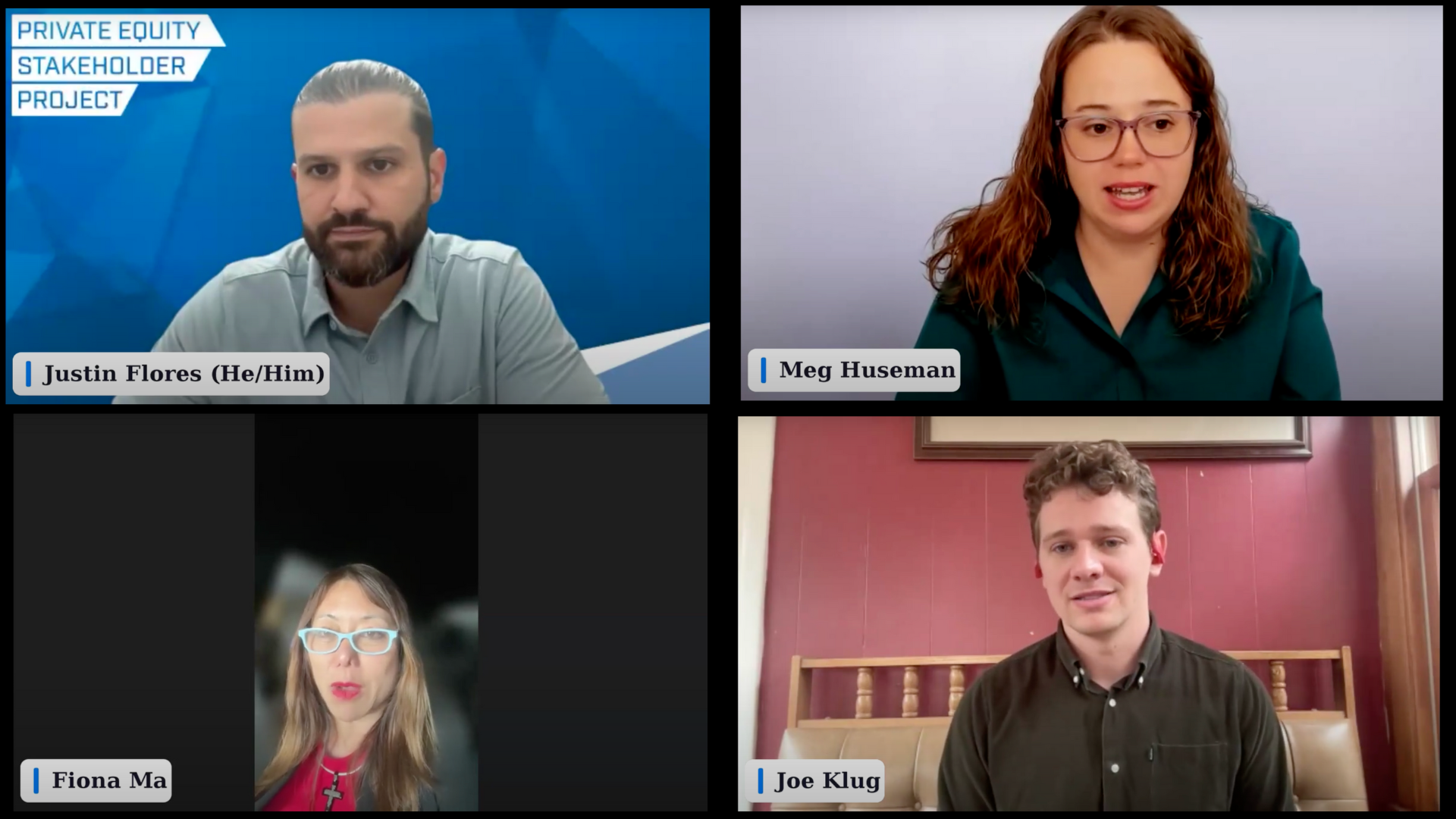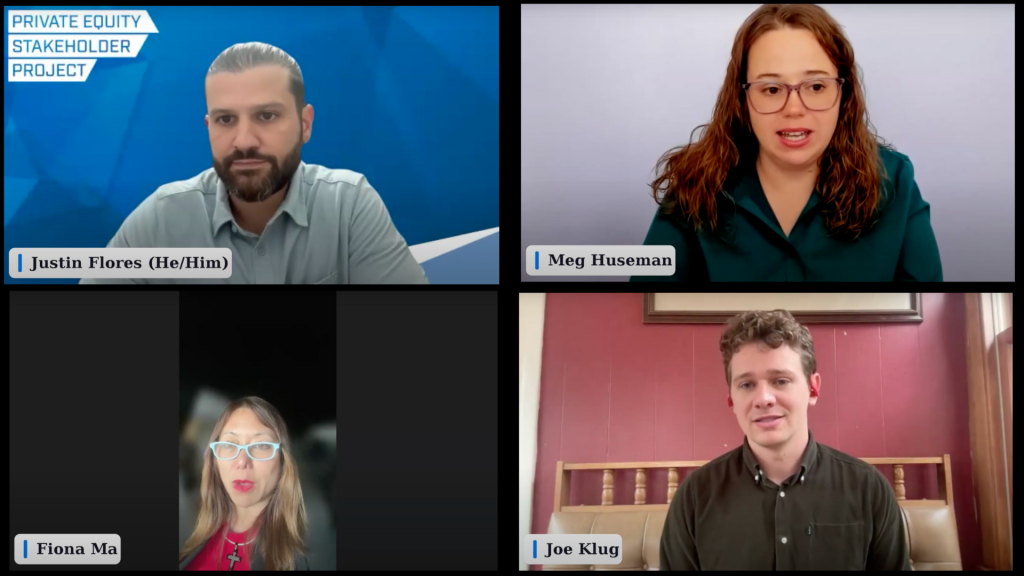
Webinar: Lost in Interpretation: When Interpreters and ASL Users Take on Private Equity
October 30, 2024
On October 24, the Private Equity Stakeholder Project (PESP) hosted a webinar to educate the public on a little-known but important federally-regulated program, the Video Relay Service (VRS) that allows users of American Sign Language to make the functional equivalent of traditional phone calls.
Panelists included two ASL interpreters that work for VRS providers, a VRS user, and the California State Treasurer. The speakers highlighted the need for improved wages and working conditions for interpreters through collective bargaining, an improved service for users, greater regulatory oversight, and more attention from public pension funds that invest in VRS providers and their private equity owners.
Speakers included:
- Dr. Shaelyn O’Riordan, Deaf Interpreter in medical and legal fields
- Fiona Ma, California State Treasurer
- Meg Huseman, VRS interpreter and ASL Interpreters’ Union member
- Joe Klug, VRS interpreter and ASL Interpreters’ Union member
- Justin Flores, Workers & Jobs Director, PESP
Building off of a groundbreaking report PESP released in August, the webinar focused on two private equity-owned companies that dominate the VRS industry: Sorenson (owned by Ariel Alternatives/Blackstone Group) and ZP Better Together (owned by Kinderhook Industries/Carlyle Group).
VRS user Dr. Shaelyn O’Riordan explained the basics of the VRS system and spoke about the urgent need for an improved VRS system for the Deaf and hard of hearing community.
“VRS is a major part of my entire life. I am a daily user of this service. Interpreters who are not able to interpret effectively have a great impact on our lives.”
Sharing a few stories about problems with the VRS system she had recently experienced related to court hearings, Dr. O’Riordan said, “It doesn’t just come down to training. We have to think about things like work conditions. Interpreters often don’t get breaks on the job. I try to make a call and I can see that the interpreter is exhausted. . . Maybe the interpreter needs a minute because they just got off a hard call. . . as Deaf community members, we deserve better access to the phone.”
Meg Huseman provided powerful testimony describing her 15 years as a VRS interpreter at Sorenson. She shared her experience as a Sorenson employee, her reasoning for joining the ASL Interpreters Union, and her hopes for a better VRS system that retains qualified interpreters and provides a better service to ASL users like her daughter.
“In the last several years, Sorenson has abandoned the Deaf community and their employees with their profit-over-people approach,” Huseman said.
She described layoffs at Sorenson that hit many Deaf employees and numerous changes that impacted interpreters ability to do the job for the long term, highlighting the vicarious trauma and lack of support interpreters can face:
“My first call might be to a doctor’s office, then I might get a call for a parent teacher conference, after that I might get a call from a mechanic shop talking about the car…then I hear the all-too-familiar ding of a 911 call. I might be witnessing an accident where the Deaf person is calling from their cell phone and I can see they are bleeding in shock or panicking…I hang up the phone and if it is not time for my break I have to take a call immediately after witnessing this traumatic event.”
She emphasized that Sorenson “should absolutely make a profit, but they are making a killing. I support a union because without one Sorenson will continue to harm the community and my family.”
California State Treasurer Fiona Ma joined the webinar highlighting her support for responsible investment policies that protect public pension funds from unnecessary risks associated with poor labor policies. She also shared her personal connection with a close friend and colleague that is Deaf and uses VRS services.
“My team and I . . . are on this call because it is important that these companies are held accountable in terms of who they are hiring and what services they are providing. We stand behind you, we support you,” said Treasurer Ma.
Joe Klug is a VRS interpreter who was laid off by ZP Better Together when the company closed a Minnesota call center without warning in January 2024 after interpreters sought to unionize. Klug said:
“I was called and told that there was an emergency meeting about our center. I was told we were all going to be laid off. We had people who had been…doing full time work at this location for a long time…We had people that in six months were going to be retiring. I had a friend who was promised full time work and quit his job to come in and work at [ZP Better Together] and we were given a last minute notice we were going to be closing. [ZP Better Together] is known for having long queues of Deaf people waiting for an interpreter. To get rid of a large center that has people who are dependable and good employees and decide you didn’t need them anymore feels crazy…We asked what decision process went behind this and they said they would get back to us but they never did. This is the type of thing we see when you aren’t focused on your consumers or employees, if you’re just focused on the profits.”
The conversation, facilitated by PESP’s Justin Flores, covered: 1. the Federal Communication Commission’s (FCC) role in oversight and funding VRS; 2. private equity and their portfolio companies’ need to meet with interpreters and commit to bargaining for improved working conditions; and 3. the role that investors can play in ensuring good labor policies at portfolio companies to limit investment risks caused by high turnover, headline risks, and labor disputes.
For more information on this topic, see PESP’s report: “Lost in Interpretation: Private equity’s capture of a vital sign language translation tool” and visit the ASL Interpreters’ Union website, Linkedin, Facebook, or Instagram.

